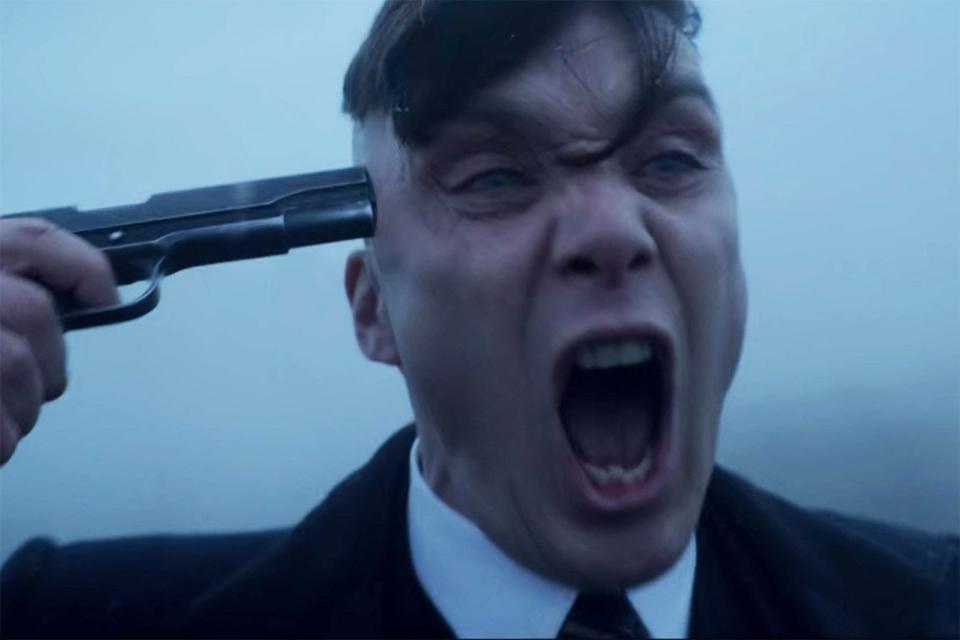What Does That 'Peaky Blinders' Season 6 Episode 1 Title Mean?

Thanks to Peaky Blinders director Anthony Byrne, we know that season six will open with an episode called 'Black Day'.
A post shared by Anthony Byrne (@antobyrne75) on Jan 26, 2020 at 3:19am PST
But what does it mean? We, er, don't really know yet. Sorry. But! There are a lot of clues there to work with, if you know where to look, and which we can make some educated guesses with.
Let's step backwards a second. Season five ended with Tommy Shelby staggering around in fog, distraught after his plan to take out fascist Oswald Mosley at a campaign rally ended in disaster and the deaths of both his mate Barney and Aberama Gold. Tormented by visions of his dead wife Grace, the last time we saw Tommy he had a revolver pointed to his own head.

'Black Day' would be a fairly solid title for an episode about Tommy's suicide. But, judging by other posts on Byrne's Instagram, the ending of season five won't turn out to have gone that way. Cillian Murphy's been in for his haircut, which suggests Tommy's not actually dead. Peaky Blinders has never been shy about bringing people back from the dead before, but it would have been an extremely bold move to kill off the big man himself.
However, one theory is that 'Black Day' might not follow on immediately from the end of season five, but catch up with Tommy some time after, his outburst and his long-running battles with post-traumatic stress disorder having led to him being incarcerated for his own safety.
Episodes have only had proper names since the start of season four, but in that time there have been three episodes with 'black' in the title: 'Blackbird' from season four, and 'Black Friday' and 'Black Cats' from season five. Apart from sounding ominous, 'Black Day' feels like a clear nod toward the season five episodes, and in particular the story arc about a potential traitor lurking within the ranks of the Shelby gang. The black cat that keeps popping up in Tommy's dreams signals danger, and a lot of fans reckon it's Michael and his wife Gina who Tommy should be wary of. The day that saw the revelation of who exactly has turned on the family would certainly be a black one.

History is usually a handy guide for where we're headed with Peaky Blinders too, and thanks to showrunner Steven Knight we already know that it's all going to end with the first sirens of the Second World War at 11:27am on 3 September 1939. Season five took us from the Wall Street Crash of 1929 up to 1932 and the launch of the British Union of Fascist (BUF), and the Battle of Cable Street in 1936, in which anti-fascist protestors stopped the BUF marching through the East End of London, would be a natural crescendo for season six to build towards.
There aren't any actual historical 'black days' before then that the title might refer to, apart from a massive dust storm during the 1935 Dust Bowl in the midwestern United States, which would presumably be of limited interest to gangsters in Birmingham. However, the 'black' of the title could refer to Mosley's blackshirts, the BUF's cover version of Benito Mussolini's paramilitary force who swore an oath to him personally, and themselves an echo of Hitler's brownshirts. Mosley's blackshirts were founded after anti-fascist groups started disrupting their rallies, and openly did fascist salutes in the street. The Daily Mail's owner Viscount Rothermere wrote a piece in praise of them in January 1934 headlined "Hurrah for the Black Shirts," and the rise of Mosley could be where the sixth season of Peaky Blinders opens.
Like this article? Sign up to our newsletter to get more delivered straight to your inbox.
You Might Also Like


